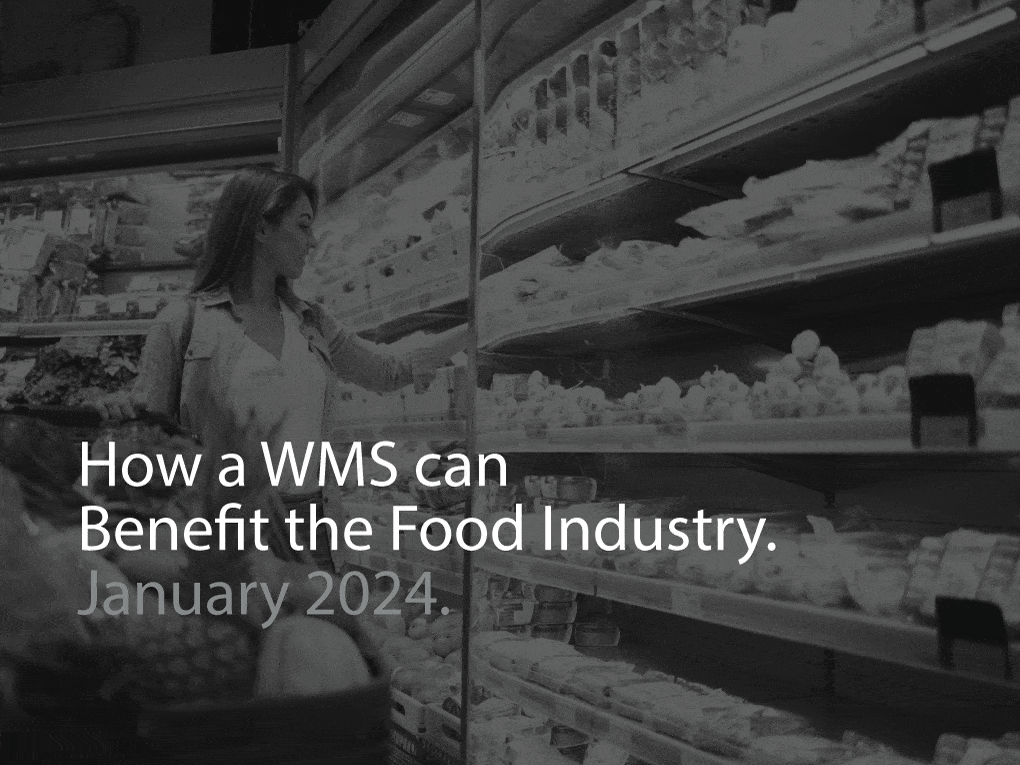How a WMS Can Benefit the Food Industry.

The food industry operates under tight margins, constant regulatory changes, and ever-increasing customer demands. Warehousing and logistics form the backbone of this industry, where timely and efficient operations can spell the difference between rancid and fresh, profit and loss.
In this high-stakes domain, a Warehouse Management System (WMS) isn’t just beneficial; it’s a critical component of success.
Streamlined Inventory Management.

A modern WMS transforms the way food warehouses manage their inventory. With real-time tracking and monitoring capabilities, it ensures that products are accounted for from the moment they land on the loading dock until they leave the warehouse.
Optimal stock rotation, particularly using the First Expired, First Out (FEFO) or the First In, First Out (FIFO) methods, is paramount when dealing with perishable goods. A WMS automates this process, significantly reducing waste and write-offs because of expired products. This efficiency is crucial for the food industry, as even a day’s delay could mean the loss of entire batches of perishables.
Efficient Order Fulfillment.

Mistakes in the picking, packing, and shipping processes are costly. A WMS optimizes these tasks by guiding warehouse staff through each step with precision and speed. The result? Reduced errors and improved customer satisfaction, thanks to consistent accuracy in orders being packed and shipped.
Highlighting order fulfilment, a WMS can manage the diverse needs of individual orders. Whether it’s specific lots with designated shelf lives or a more significant, more complex request that requires cross-docking.
Enhanced Traceability and Compliance.

Traceability is a non-negotiable aspect of the food and beverage industry. Every item must be tracked with a detailed log of its journey through the supply chain. Here, a WMS shines, providing lot and batch tracking capabilities. This is essential for not just business operations but also regulatory compliance.
In instances of food safety issues or recalls, a WMS speeds up the identification and removal process for affected items. This level of traceability supports adherence to stringent industry standards, keeping the public safe and your company compliant and accountable.
Improved Supply Chain Visibility.

End-to-end supply chain visibility is significant considering the real-time visibility needs of the food and beverage industry. A WMS integrates smoothly with sensors and IoT devices to provide insightful data. This aids immediate decision-making and longer-term strategic planning like demand forecasting and inventory optimisation.
This visibility allows food industry professionals to preempt surges or dips in demand, adjusting their procurement and production accordingly. This process makes an extreme difference during peak
Cost Savings and Operational Efficiency.

Efficiency is a keyword when discussing a Warehouse Management System. Among other benefits, a WMS can lead to reduced labour costs. Automation and optimised workflows allow the same work volume to be managed with fewer manual inputs.
The arrangement of goods is another area where a WMS earns its keep. By optimising warehouse layout and space utilisation, a WMS can reduce the space needed for storage or free up space for additional commodities.
Integration with Other Systems.

The best WMS solutions don’t work in isolation but integrate seamlessly with other systems and software. This integration ensures that data is synchronised throughout every part of the business, improving accuracy and decision-making across the board.
A comprehensive WMS solution should integrate with several other systems:
- Enterprise Resource Planning (ERP) Systems: Seamless integration with ERP systems ensures data synchronisation across all business areas. This improves decision-making and allows for a holistic view of operations and finances.
- Transportation Management System (TMS): A TMS works hand-in-hand with a WMS to manage the transportation aspect of the supply chain. This ensures food products are delivered in an efficient, cost-effective manner from the warehouse to their final destination.
- Customer Relationship Management (CRM) Systems: CRM systems track all interactions and transactions with customers. Integrated with a WMS, they can provide valuable insights into customer buying habits, preferences, and feedback that can be used to improve warehouse operations and customer service.
- Data Analytics Tools: Data analytics tools can process data from a WMS to generate actionable insights and reports. This can help identify operational inefficiencies, predict future trends, and make informed business decisions.
- E-commerce Platforms: For food companies that sell online, integration between a WMS and e-commerce platforms ensures real-time inventory updates on the website and efficient order fulfilment.
When these various systems are integrated with a WMS, the result is enhanced communication, heightened automation, and increased operational efficiency. In essence, it serves to fortify and make the food supply chain more agile and responsive.
Case Studies.
Classic Fine Foods
Classic Fine Foods, a luxury foods company, improved its operations significantly after implementing Körber WMS. They enjoyed more straightforward stock takes, and better inventory control. With these improvements, they could better meet tight delivery times demanded by their high-profile clients.
Wing Yip
A leading supplier of Oriental food, Wing Yip, leveraged Accellos WMS (now part of Körber) and SAP Business One to turn their complex operations into a streamlined process. This dual implementation saw them reducing errors, speeding up order processing, and most importantly, maintaining their quality standards.
Conclusion.

Investing in a Warehouse Management System (WMS) within the food industry represents more than a mere advancement in technology. It is a pledge to maintain a high standard of quality, efficiency, and growth. From guaranteeing regulatory compliance and precise inventory control to improving order fulfilment, the incorporation of a WMS brings about immediate advantages. It provides businesses with a competitive edge in the dynamic and ever-evolving food market.
Adopting a Warehouse Management System (WMS) is vital in maintaining an efficient and successful food industry. It ensures detailed product tracking, meticulous noting of expiry dates, and precise order deliveries. These operations form the crucial components of a robust food industry mechanism.
The tangible results of implementing a WMS are evident in numerous case studies and daily functionalities. Industry professionals acknowledge that intelligent warehouse operations extend beyond mere packing and shipping. They lay a foundation that fosters scalability, adaptability, and profitability, enhancing the overall business performance.
So, don’t wait any longer—join the WMS revolution today! The future of the food industry is here, powered by warehouse management technology. Let your business be part of this transformation and reap the benefits for years to come. Happy warehousing!